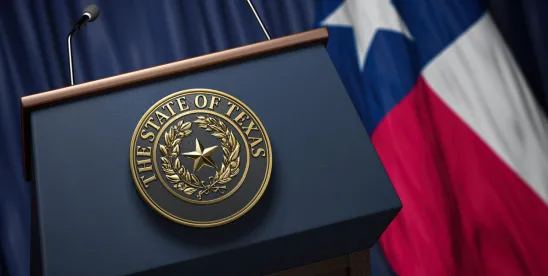Ten days ahead of her self-imposed deadline, Judge Ada Brown of the Northern District of Texas issued a memorandum opinion and order granting the plaintiffs’ motions for summary judgment, setting aside the Federal Trade Commission’s forthcoming Noncompete Ban nationwide, which was set to go into effect on September 4, 2024.
In other words, as we predicted, the FTC’s Noncompete Ban is dead nationwide unless and until a Circuit Court of Appeals or the Supreme Court of the United States revives it.
Judge Brown granted plaintiffs’ summary judgment motion as to every claim under the Administrative Procedures Act (APA) and the Declaratory Judgment Act (DJA), ruling that the FTC exceeded its statutory authority when it issued the Noncompete Ban and that the Noncompete Ban is arbitrary and capricious.
Judge Brown set the tone for her decision by quoting the Supreme Court’s recent opinion in Loper Bright Enters. v. Raimondo, 144 S.Ct. 2244, 2261 (2024), where the Court overruled the principle of Chevron deference established in Chevron U.S.A., Inc. v. Nat’l Res. Def. Council, Inc. (1984), stating: “Congress in 1946 enacted the APA as a check upon administrators whose zeal might otherwise have carried them to excesses not contemplated in legislation creating their offices.”
The FTC Lacks Substantive Rulemaking Authority as to Unfair Methods of Competition
The first question decided by Judge Brown was whether the FTC exceeded its Congressional authority under Section 6(g) of the FTC Act by issuing substantive rules regarding unfair methods of competition (the FTC argued that noncompetes should be included as an unfair method of competition, with only limited exceptions).
Judge Brown followed the cannons of statutory interpretation, giving effect to the plain meaning of the legislative text of Section 6(g) of the FTC Act, when viewed in conjunction with the history of the FTC Act. She noted that while Section 18 of the FTC Act acknowledges that the FTC has authority to make some rules regarding unfair methods of competition in or affecting commerce, “[b]y a plain reading, Section 6(g) of the Act does not expressly grant the FTC authority to promulgate substantive rules regarding unfair methods of competition.” The court noted that Congress did not authorize the FTC to issue sanctions for violations of rules issued under Section 6(g), evidencing that Congress did not intend for that authority to include substantive rulemaking. The court also recognized the Magnuson-Moss Act, whereby Congress expressly vested the FTC with substantive rulemaking regarding only unfair or deceptive acts or practice (not unfair methods of competition). Thus, the court reasoned that Congress intended to authorize limited substantive rulemaking and otherwise curb the FTC’s substantive rulemaking regarding other topics.
The Noncompete Ban Must be Set Aside because it is Arbitrary and Capricious
The court could have limited its ruling to finding that the FTC exceeded its statutory authority to issue the Noncompete Ban; however, Judge Brown was evidently not content with leaving anything on the line. She held that the Final Rule is not only beyond the FTC’s statutory authority, but an arbitrary and capricious one at that. In assessing whether an agency’s action is arbitrary and capricious, the court must be satisfied that the agency’s action is both “reasonable and reasonably explained[.]”
The court held that the Noncompete Ban failed the reasonableness test, relying on many of the same arguments and cases EBG relied upon in an amicus brief filed on behalf of 11 national industry organizations. Judge Brown ruled that the Noncompete Ban is overbroad in imposing a one-size-fits-all approach in perpetuity untethered to the facts found or rational choices. The opinion highlights that the FTC “relied on a handful of studies that examine the economic effects of various state policies toward non-competes” despite that “no state has enacted a non-compete rule as broad as the FTC’s Rule” seemingly without evidence regarding why the FTC chose such as sweeping prohibition instead of a more rational, tailored approach. The court succinctly concluded: “In sum, the Rule is based on inconsistent and flawed empirical evidence, fails to consider the positive benefits of noncompete agreements, and disregards the substantial body of evidence supporting these agreements.”
Impact of the Ruling
Having determined that the FTC exceeded its Congressional authority and issued an arbitrary and capricious rule, the court held that the appropriate remedy under the APA is to set aside the Noncompete Ban. But as to whom?
Unlike the preliminary injunction, which the court granted only as to the named plaintiffs and intervenors, the court ruled that the APA does not contemplate party-specific relief; i.e., the Noncompete Ban is set aside with nationwide effect and it will not go into effect on September 4, 2024 as planned.
For now, employers who use noncompetes can breathe a temporary sigh of relief and avoid scrambling to issue notices to employees that their noncompete agreements are set to expire over the Labor Day Weekend. But the battle is not over, given that the court issued an opinion and final judgment in the case, rendering it immediately appealable to the United States Court of Appeals for the Fifth Circuit (and subject to emergency motion practice there), and the ATS Tree Services case continues to be litigated in Pennsylvania, where the Court ruled preliminarily that the FTC has the authority to issue the rule. We will continue to monitor and report on these cases.
In addition, employers can expect that states will continue to introduce legislation aimed at restricting the use of noncompetes. As you may recall, New York, Maine, and Rhode Island all introduced legislation seeking to ban noncompetes, but those bills were all vetoed. Employers should anticipate that these states, and others, will likely introduce other bills aimed at limiting noncompetes.





 />i
/>i

